As he began to gain recognition as a player, he was named to the Soviet Union National Team for the 1991 European Junior Championships where he won a silver medal.
This was a time of great political upheaval in the world, and during his second season of play in the third division, the Soviet Union was dissolved and the Commonwealth of Independent States came into being. For the 1992-93 season, Skudra played for his hometown Pardugava Riga club. Despite only being 19 years old at the time, Skudra was named to the revival of the Latvia National Team for their return to international hockey since 1939.
The Latvians were forced to begin at the base of IIHF ladder system in the World Championships "C" Pool, which they immediately won, earning them a promotion to the "B" Pool for 1994. After another season of domestic hockey in Riga and a second World Championships for Latvia, Skudra took the bold step of coming to the United States as an undrafted free agent, where he started his road to the NHL with a season with the Greensboro Monarchs of the ECHL, where he went 13-9-5 in 33 games. He also appeared in a pair of games with the Memphis RiverKings of the CHL.
The next two seasons Skudra made several more stops, splitting 1995-96 between the Eire Panthers (12 games) and the Johnstown Chiefs (30 games), both of the ECHL.
The following season was one of progress for Skudra, as he took a step closer to the NHL by playing for the Hamilton Bulldogs of the American Hockey League in 32 games after starting the season with another 4 games in Johnstown. Following the season he made his third appearance in the World Championships for Latvia, who by now had earned another promotion, this one to the top level of the IIHF ladder.
Prior to the 1997-98 season, Skudra was signed by the Pittsburgh Penguins organization of the NHL. He began his season with the Houston Aeros of the International Hockey League for 9 games before realizing his dream when he made his NHL debut with the Penguins with 27 minutes of relief for starter Ken Wregget on November 5, 1997. Two nights later he earned a tie agains the Detroit Red Wings in his first start. After relieving Tom Barasso twice, Skudra got his next start in December 6th, where he earned his first NHL victory against the Mighty Ducks of Anaheim.
With both Wregget and Barasso healthy, Skudra also got some playing time that season with the Kansas City Blades in the IHL, posting an excellent 10-3-0 record, which earned him another call up to Pittsburgh, with whom he eventually totaled 6 wins for the season.
He spent the entire 1998-99 season with Pittsburgh, splitting time with Barasso. He posted NHL career highs with 37 games and 15 wins and continued with the Penguins in 1999-00 while backing up Jean-Sebastien Aubin with 20 appearances. He also played in the first NHL playoff game of his career during the postseason.
In an odd series of transactions, Skudra was signed by the Boston Bruins on October 3, 2000 but then claimed on waivers by the Buffalo Sabres just three days later. His entire career with Buffalo lasted just 27 seconds in relief of Dominik Hasek, who returned to the crease to finish the game.
He was on the Sabres roster riding the bench behind the iron man Hasek or spending 2 games in the AHL with the Rochester Americans until he was reclaimed off of waivers by the Bruins five weeks later! He eventually was able to play in 26 games in the crowded Bruins goaltending situation, as they used Byron Dafoe as their number one (45 games), Skudra (26). Andrew Raycroft (15), John Grahame (10) and Kay Whitmore (5). Skudra also made 3 appearances with the Providence Bruins, his fourth team of the season.
He played in 3 games for the Hartford Wolf Pack in the AHL at the start of the 2000-01 season, winning all three. That good start earned him a contract with the Vancouver Canucks as a backup to Dan Cloutier. He played in 23 games for Vancouver, winning 10, the second highest of his NHL career. He also saw action in a pair of playoff games against Detroit.
His second season with Vancouver saw him post nearly identical numbers with the same 23 appearances as well as 9 wins. He also made a single appearance for the Manitoba Moose in the AHL.
That summer he signed with CSKA Moscow and saw 24 games in goal in 2005-06 and another 19 in 2006-07 before moving to Metallurg Novokuzenzk for the final 13 games of his career before retiring after playing 13 seasons for teams in four different countries in eight different leagues for 20 different teams!
Today's featured jersey is a 2002-03 Vancouver Canucks Peter Skudra jersey. This alternate style was introduced in the 2001-02 season and was used through the 2005-06 season. It was a dark and moody affair, and quite unusual with it's main body that faded from deep blue to deep red, unlike any other in the NHL at the time. Also unconventional was the choice of metallic silver for the names, numbers and trim color rather than white.
It was a very polarizing design that fans either embraced or detested with only the bizarre Phoenix Coyotes alternate standing between it and being the strangest jersey in the NHL at the time and definitely benefitted from being wrapped around a player in 3-D when compared to seeing it laid on a flat surface or as an illustration as much as any jersey we can remember.
Bonus jersey: Today's bonus jersey is a 2005-06 CSKA Moscow Peter Skudra jersey. At the opposite end of the spectrum from the unusual Canucks alternate, this classic hockey jersey from Russia's most storied team, Central Red Army. It embraces the classic look of colored shoulders with simple arm and waist stripes and a bold main crest. In addition is has the traditional band around the chest which evokes the Montreal Canadiens iconic sweaters. Add some bold red stars to the shoulder and arms and you have a jersey which screams "hockey" with pride.

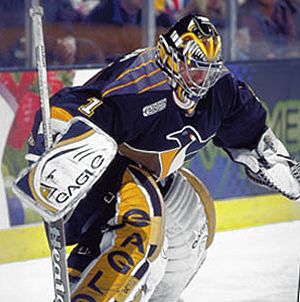
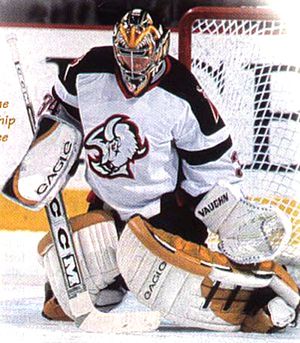
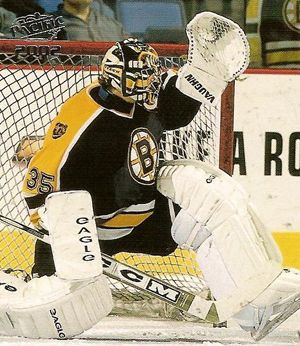
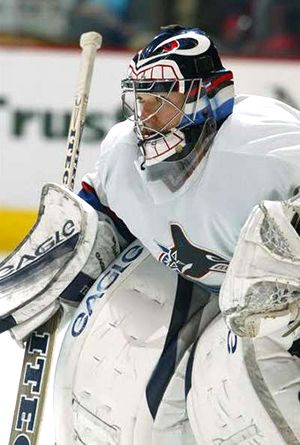
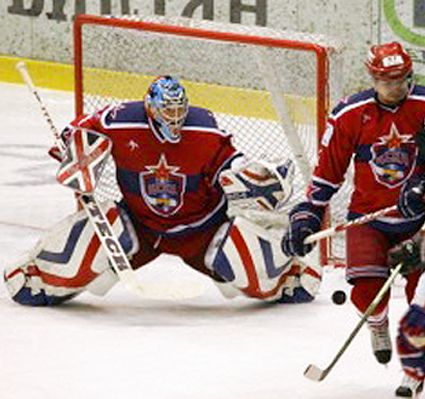
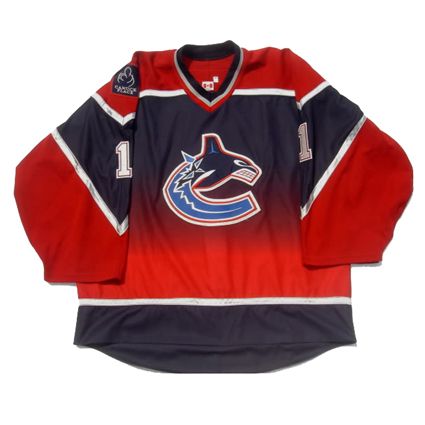
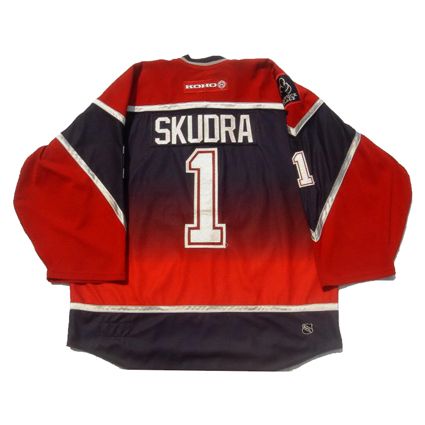
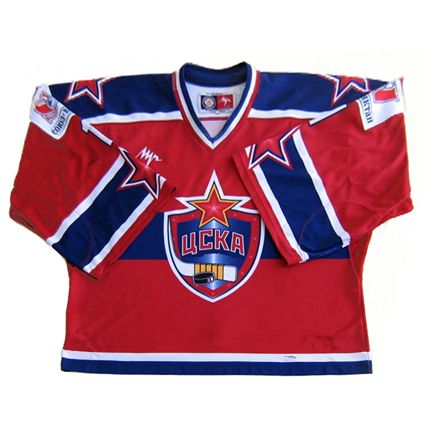
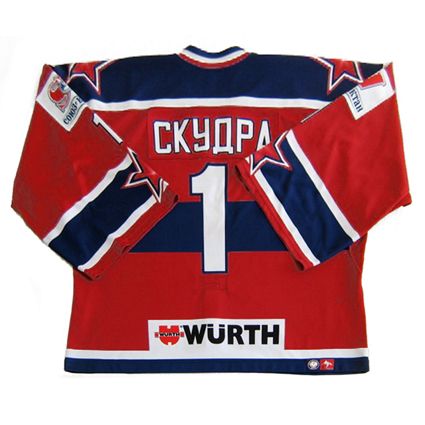










No comments:
Post a Comment
We welcome and encourage genuine comments and corrections from our readers. Please no spam. It will not be approved and never seen.